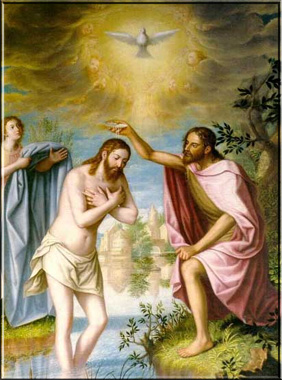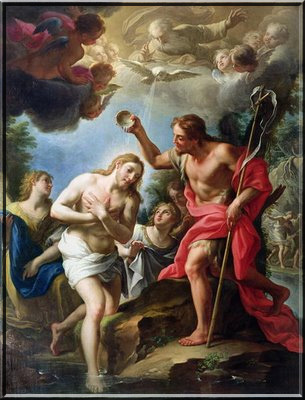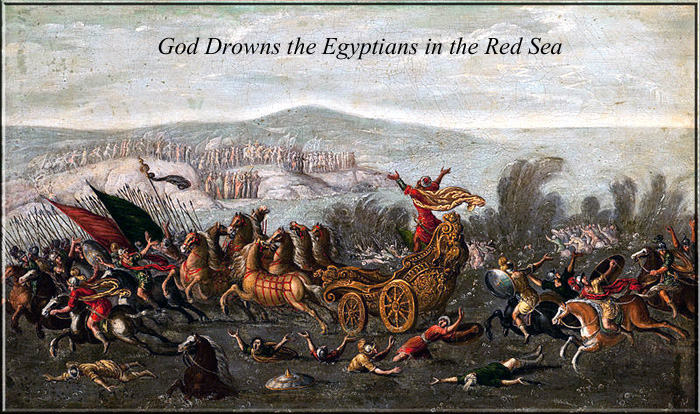|
And when Moses had stretched forth his hand towards the sea, it returned at the first break of day to the former place: and as the Egyptians were fleeing away, the waters came upon them, and the Lord shut them up in the middle of the waves.--Exodus 14: 27
Liturgical Year: Easter Wednesday
by Dom Gueranger, 1908
This is the day which the Lord hath made: let us be glad and rejoice therein. The Hebrew word Pasch signifies passage, and we explained yesterday how this great day first became sacred by reason of the Lord's Passover. But there is another meaning which attaches to the word, as we learn from the early Fathers, and the Jewish rabbins. The Pasch is, moreover, the passage of the Israelites from Egypt to the Promised Land. These three great facts really happened on one and the same night:--the banquet of the lamb, the death of the first-born of the Egyptians, and the departure from Egypt. Let us, today, consider how this third figure is a further development of our Easter mystery.
The day of Israel's setting forth from Egypt for his predestined country of the Promised Land, is the most important in his whole history; but, both the departure itself, and the circumstances that attended it, were types of future realities to be fulfilled in the Christian Pasch. The people of God was delivered from an idolatrous and tyrannical country: in our Pasch, they who are now our neophytes have courageously emancipated themselves from the slavish sway of satan, and have solemnly renounced the pomps and works of this haughty Pharaoh.
On their road to the Promised Land, the Israelites had to pass through a sea of water; their doing so was a necessity, both for their protection against Pharaoh's army, which was pursuing them, and for their entrance into the land of milk and honey. Our neophytes too, after renouncing the tyrant who had enslaved them, had to go through that same saving element of water, in order to escape their fierce enemies; it carried them safe into the land of their hopes, and stood as a rampart to defend them against invasion.
By the goodness of God, that water, which is an obstacle to man's pursuing his way, was turned into an ally for Israel's march; the laws it had from nature were suspended, and it became the savior of God's people. In like manner, the sacred font,--which, as the Church told us on the Feast of the Epiphany, is made an instrument of divine grace,--has become the refuge and fortress of our happy neophytes; their passing through its waters has put them out of reach of the tyrant's grasp.
Having reached the opposite shore, the Israelites see Pharaoh and his army, their shields and their chariots, buried in the sea. When our neophytes looked at the holy font, from which they had risen to the life of grace, they rejoiced to see the tomb where their sins, enemies worse than Pharaoh and his minions, lay buried for ever.
Then did the Israelites march cheerfully on towards the land that God had promised to give them. During the journey, they will have God as their teacher and lawgiver; they will have their thirst quenched by fountains springing up from a rock in the desert; they will be fed on manna sent each day from heaven. Our neophytes, too, will run on unfettered to the heavenly country, their Promised Land. They will go through the desert of this world, uninjured by its miseries and dangers, for the divine lawgiver will teach them, not amidst thunder and lightning, as He did when He gave His law to the Israelites, but with persuasive words of gentlest love, spoken with that sweet manner which set on fire the hearts of the two disciples of Emmaus. Springs of water shall refresh them at every turn, yea of that living water which Jesus, a few weeks back, told the Samaritan woman should be given to them that adore Him in spirit and in truth. And lastly, a heavenly Manna shall be their food, strengthening and delighting them--a Manna far better than that of old, for it will give them immortality.
So that our Pasch means all this: it is a passing through water to the Land of Promise, but with a reality and truth which the Israelites had only under the veil of types, sublime indeed and divine, but mere types. Let then our Passover from the death of original sin to the life of grace, by holy Baptism, be a great feast-day with us. This may not be the anniversary of our Baptism: it matters not; let us fervently celebrate our exodus from the Egypt of the world into the Christian Church; let us, with glad and grateful hearts, renew our baptismal vows, which made our God so liberal in His gifts to us: let us renounce satan, and all his works, and all his pomps.
 T
The Apostle of the Gentiles tells us of another mystery of the waters of Baptism; it gives completion to all we have been saying, and equally forms part of our Pasch. He teaches us, that we were hidden beneath this water, as was Christ in His tomb; and that we then died, and were buried, together with Him (1 Rom. vi. 4). It was the death of our life of sin: that we might live to God, we had to die to sin. When we think of the holy font where we were regenerated, let us call it the tomb, wherein we buried the Old Man, who was to have no resurrection. Baptism by immersion,--which was the ancient mode of administering the Sacrament, and is still used in some countries,--was expressive of this spiritual. burial: the neophyte was made to disappear beneath the water: he was dead to his former life, as our buried Jesus was to His mortal life. But, as our Redeemer did not remain in the tomb, but rose again to a new life, so likewise, says the Apostle (Coloss. ii. 12), they who are baptized, rise again with Him when they come from the font; they bear on them the pledges of immortality and glory, and are the true and living members of that Head, who dieth now no more. Here, again, is our Pasch, our passage from death to life.
At Rome, the Station is in the basilica of Saint Laurence outside the Walls. It is looked upon as the most important of the many churches built by Rome in honor of her favorite Martyr, whose body lies under the high altar. Hither were the neophytes led today, that they might learn, from the example of so brave and generous a soldier of Christ, how courageous they should be in confessing their faith, and how faithful in living up to their baptismal vows. For several centuries, the reception of Baptism was a preparation for martyrdom; but, at all times, it is an enlisting in the service of Christ, which we cannot leave without incurring the guilt and penalty of traitors.
 The Gift of Water Baptism
The Gift of Water Baptism
that Opens the Gates of Heaven
by Dom Gueranger, 1897
The thoughts of the Church, today, are fixed on the Baptism of our Lord in the Jordan, which is the second of the three Mysteries of the Epiphany. The Emmanuel manifested Himself to the Magi, after having shown Himself to the Shepherds; but this manifestation was made within the narrow space of a stable at Bethlehem, and the world knew nothing of it. In the Mystery of the Jordan, Christ manifested himself with greater publicity. His coming is proclaimed by the Precursor; the crowd, that is flocking to the river for Baptism, is witness of what happens; Jesus makes this the beginning of His public life. But who could worthily explain the glorious circumstances of this second Epiphany?
It resembles the first in this, that it is for the benefit and salvation of the human race. The Star has led the Magi to Christ; they had long waited for His coming, they had hoped for it; now, they believe. Faith in the Messias' having come into the world is beginning to take root among the Gentiles. But faith is not sufficient for salvation; the stain of sin must be washed away by water. He that believeth and is baptised, shall be saved (St. Mark, xvi. 16). The time is come, then, for a new manifestation of the Son of God, whereby there shall be inaugurated the great remedy, which is to give to Faith the power of producing life eternal.
Now, the decrees of divine Wisdom had chosen Water as the instrument of this sublime regeneration of the human race. Hence, in the beginning of the world, we find the Spirit of God moving over the Waters (Gen. i. 2), in order that they might "even then conceive a principle of sanctifying power," as the Church expresses it in her Office for Holy Saturday (The Blessing of the Font). But, before being called to fulfil the designs of God's mercy, this element of Water had to be used by the divine justice for the chastisement of a sinful world. With the exception of one family, the whole human race perished, by the terrible judgment of God, in the Waters of the Deluge.
A fresh indication of the future supernatural power of this chosen element was given by the Dove, which Noe sent forth from the Ark; it returned to him, bearing in its beak an Olive-branch, the symbol that peace was given to the earth by its having been buried in Water. But, this was only the announcement of the mystery; its accomplishment was not to be for long ages to come.
Meanwhile, God spoke to His people by many events, which were figurative of the future Mystery of Baptism. Thus, for example, it was by passing through the waters of the Red Sea, that they entered into the Promised Land, and during the miraculous passage, a pillar of a cloud was seen covering both the Israelites, and the Waters, to which they owed their deliverance.
But, in order that Water should have the power to purify man from his sins, it was necessary that it should be brought in contact with the Sacred Body of the Incarnate God. The Eternal Father had sent His Son into the world, not only that He might be its Lawgiver, and Redeemer, and the Victim of its salvation--but that He might also be the Sanctifier of Water; and it was in this sacred element that He would divinely bear testimony to His being His Son, and manifest Him to the world a second time.
Jesus, therefore, being now thirty years of age, comes to the Jordan, a river already celebrated for the prophetic miracles which had been wrought in its waters. The Jewish people, roused by the preaching of John the Baptist, were flocking thither in order to receive a Baptism, which could, indeed, excite a sorrow for sin, but could not effect its forgiveness. Our divine King approaches the river, not, of course, to receive sanctification, for He Himself is the author of all Justice--but to impart to Water the power of bringing forth, as the Church expresses the mystery, a new and heavenly progeny (The Blessing of the Font). He goes down into the stream, not, like Josue, to walk dry-shod through its bed, but to let its waters encompass Him, and receive from Him, both for itself and for the Waters of the whole earth, the sanctifying power which they would retain forever. The saintly Baptist places his trembling hand upon the sacred head of the Redeemer, and bends it beneath the water; the Sun of Justice vivifies this His creature; He imparts to it the glow of life-giving fruitfulness; and Water thus becomes the prolific source of supernaturnal life.
But, in this the commencement of a new creation, we look for the intervention of the Three Persons of the Blessed Trinity. All Three are there. The heavens open; the Dove descends, not as a mere symbol, prophetic of some future grace, but as the sign of the actual presence of the Holy Ghost, the Spirit of love, who gives peace to men and changes their hearts. The Dove hovers above the head of Jesus, overshadowing, at one and the same time, the Humanity of the Incarnate Word and the water which bathed His sacred Body.
The manifestation is not complete; the Father's voice is still to be heard speaking over the Water, and moving by its power the entire element throughout the earth. Then was fulfilled the prophecy of David: The Voice of the Lord is upon the waters; the God of majesty hath thundered. The Voice of the Lord breaketh cedars, (that is, the pride of the devils). The Voice of the Lord divideth the flame of fire, (that is, the anger of God). The Voice of the Lord shaketh the desert, and maketh the flood to dwell, (that is, announces a new Deluge, the Deluge of divine Mercy) (Ps. cssviii. 3, 5, 7, 8, 10). And what says this Voice of the Father? This is my beloved Son, in whom I am well pleased (St. Matth. iii. 17).
Thus was the Holiness of the Emmanuel manifested by the presence of the Dove and by the voice of the Father, as His kingly character had been previously manifested by the mute testimony of the Star. The mystery is accomplished, the Waters are invested with a spiritual purifying power, and Jesus comes from the Jordan and ascends the bank, raising up with Himself the world, regenerated and sanctified, with all its crimes and defilements drowned in the stream. Such is the interpretation and language of the Holy Fathers of the Church regarding this great event of our Lord's Life.
Let us honour our Lord in this second Manifestation of His divinity, and thank Him, with the Church for His having given us both the Star of Faith which enlightens us, and the Water of Baptism which cleanses us from our iniquities. Let us lovingly appreciate the humility of our Jesus, who permits Himself to be weighed down by the hand of a mortal man, in order, as He says Himself, that He might fulfil all justice (St. Matth. iii. 15); for having taken on Himself the likeness of sin, it was requisite that He should bear its humiliation, that so He might raise us from our debasement. Let us thank Him for this grace of Baptism, which has opened to us the gates of the Church both of heaven and earth; and let us renew the engagements we made at the holy Font, for they were the terms on which we were regenerated to our new life in God.
A Renewal of Baptismal Vows
Most Holy Trinity, Father, Son and Holy Ghost, One God, I mourn and lamentt my
most sinful neglect of the sacred promise and vow which was made in my name at my Baptism.
I lament my long-continued transgressions, my ingratitude, my coldness and hardness of
heart. O Lord, Who art the great Searcher of hearts, and from whom no secrets are hid,
in Thy presence I do most freely, fully, and unfeighnedly, from henceforth and for evermore,
repentof and renounce all my sins; I resolve, to the utmost of the power Thou givest me, to
resist all the temptations of the devil, the world, and the flesh, so that I may never willingly
be led by them. I do firmlly believe, and will, by Thy help, continue in the belief of all
the Articles of the Christian Faith, and I am resolved, in all sincerity of heart, to keep Thy
holy Will and Commandments, and to persevere, through the help of Thy grace, to the end of my
life. Enlighten and strengthen me, O God, by Thy Holy Spirit to perform this my vow and convenant.
Preserve me as a living and faithful Member of Thy Church, a dutiful and dear child of God, and an
inheritor of the Kingdom of Heaven; that through Thy mercy I may in Thy good time obtain the
end of my faith, even the salvation of my soul. Amen
http://catholicharboroffaithandmorals.com/
|


